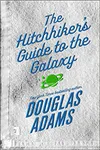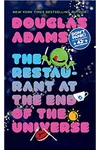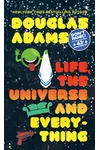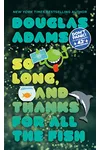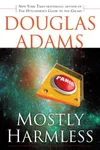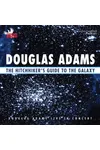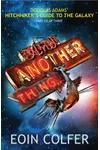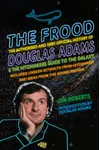Step into the zany, universe-hopping world of The Hitchhiker’s Guide to the Galaxy, where a towel is your best friend and the answer to life’s ultimate question is 42! Douglas Adams’ beloved science fiction series blends absurd humor, philosophical musings, and cosmic adventure, following everyman Arthur Dent on a whirlwind journey through space after Earth’s untimely demolition.
With its razor-sharp wit and quirky take on existence, this series has charmed readers for over four decades, offering a hilarious yet poignant lens on humanity’s place in the cosmos. Ready to explore the galaxy with a Pan-Galactic Gargle Blaster in hand? Let’s dive in!
How The Hitchhiker’s Guide to the Galaxy Began
Born from a drunken idea in a field, The Hitchhiker’s Guide to the Galaxy started as a 1978 BBC radio comedy by Douglas Adams, a young writer with a knack for blending satire and sci-fi. Inspired by his travels and a real guidebook for European hitchhikers, Adams crafted a universe where absurdity reigns supreme. The radio success sparked a 1979 novel, launching a cultural phenomenon that spanned books, TV, and film.
The Heart of The Hitchhiker’s Guide to the Galaxy
The series kicks off with The Hitchhiker’s Guide to the Galaxy (1979), where Arthur Dent escapes Earth’s destruction with alien pal Ford Prefect, stumbling into a cosmic odyssey guided by a quirky electronic book. The Restaurant at the End of the Universe (1980) ups the ante, with our heroes dining at a time-bending eatery while dodging galactic chaos. Life, the Universe and Everything (1982) tackles existential crises and cricket-loving robots, while So Long, and Thanks for All the Fish (1984) brings Arthur back to a peculiarly resurrected Earth.
Adams’ universe thrives on themes of absurdity, curiosity, and the search for meaning in an indifferent cosmos. His conversational style, packed with witty asides and improbable scenarios—like a whale falling from the sky—creates a setting both alien and relatable. From Vogon poetry to Marvin the Paranoid Android’s chronic depression, the series revels in its playful defiance of sci-fi norms.
Why The Hitchhiker’s Guide to the Galaxy Resonates
The Hitchhiker’s Guide to the Galaxy redefined sci-fi comedy, influencing works like Doctor Who and Red Dwarf. Its irreverent humor and philosophical undertones resonate with fans grappling with life’s big questions, while phrases like “Don’t Panic!” and the number 42 have seeped into pop culture. The series’ enduring appeal lies in its ability to make the vast universe feel oddly comforting, even when it’s utterly bizarre.
- Publication Years: 1979–1992 (main series)
- Number of Books: Five main novels, plus a sixth by Eoin Colfer
- Notable Adaptations: BBC radio, 1981 TV series, 2005 film
Grab The Hitchhiker’s Guide to the Galaxy and blast off into Douglas Adams’ hilarious, thought-provoking universe—towel not included, but highly recommended!
